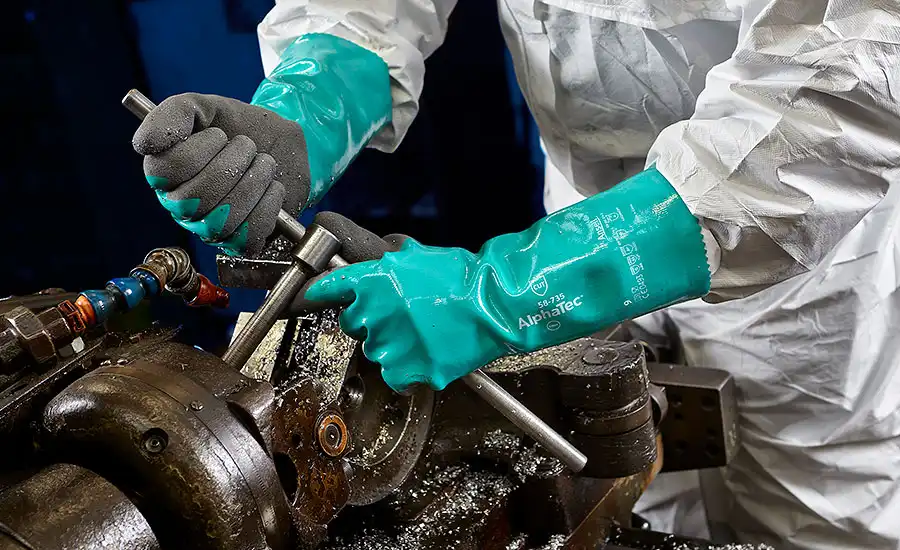Chemical resistant gloves are a critical part of workplace safety for anyone handling hazardous substances. From laboratories and manufacturing lines to cleaning services and automotive repair shops, these gloves help prevent skin irritation, burns, and other severe injuries. However, despite their widespread use, many workers and employers fall into a dangerous trap: assuming that chemical resistant gloves can be used in all scenarios.
In reality, using the wrong type of glove—or using a chemical glove in the wrong situation—can be just as hazardous as not wearing gloves at all. In this post, we’ll break down the most common misconceptions about chemical-resistant gloves, highlight situations where they should not be used, and help you make better safety choices.
💥 Misconception 1: “All Chemical Resistant Gloves Are the Same”
Not all chemical-resistant gloves are created equal. Different glove materials offer resistance to different types of chemicals. For example:
Nitrile gloves are resistant to oils, solvents, and some acids, but not strong oxidizing agents.
Latex gloves offer protection against biological hazards and some weak acids but degrade quickly in organic solvents.
PVC and neoprene gloves offer broader chemical resistance but may be too bulky for precision work.
Using latex gloves (large or small) to handle solvents like acetone or gasoline is dangerous, as the material will break down and allow the chemical to penetrate. This is why it’s essential to match the glove material to the specific chemical hazard.
👉 Tip: Refer to chemical compatibility charts before selecting gloves.(Related articles:How Does Industrial Glove Prevent Chemical Exposure?)
🚫 When You Should Not Use Chemical Resistant Gloves
Let’s take a look at 5 key scenarios where chemical-resistant gloves may not be appropriate—or may require closer evaluation:
1. High Heat Environments(Related articles: How to Choose Gardening Gloves for Women?)
Chemical-resistant gloves, such as black rubber gloves or nitrile-coated styles, are often made for chemical resistance but not thermal resistance. Using them in environments with high temperatures (e.g., near furnaces, heated machinery, or open flames) can cause the glove to melt or degrade.
✅ Use instead: Heat-resistant gloves with chemical overlays or dual-layer protection.
2. Electrical Work
Rubber-based chemical gloves, especially black rubber gloves or latex gloves, conduct electricity when wet or contaminated. Wearing these gloves while working around live circuits, battery systems, or other electrical components poses a significant shock risk.(Related articles: The 5 Most Popular Safety Gloves For Summer 2025)
✅ Use instead: Dielectric gloves specifically rated for electrical insulation, not standard chemical gloves.
3. Heavy Mechanical Work or Sharp Edges
While chemical-resistant gloves provide barrier protection, most are not cut-resistant or puncture-proof. Tasks involving sharp tools, metal edges, glass, or wire may shred thin latex gloves or nitrile gloves—exposing hands to both cuts and chemical exposure.
✅ Use instead: Cut-resistant gloves with a chemical-resistant coating or layered PPE.
4. Long-Term Immersion in Strong Solvents
Many workers believe they can immerse chemical gloves in strong industrial solvents like MEK, toluene, or benzene for extended periods. However, many materials (including grease monkey gloves) will eventually degrade under prolonged chemical contact, allowing permeation to occur.
✅ Use instead: specialized gloves rated for extended exposure or switch to glove rotation strategies.(Related articles: Light Work PU-Coated Gloves for Daily Comfort & Protection)
5. Reusing Disposable Gloves
One of the most common mistakes is reusing disposable Chemical resistant gloves (especially in labs or medical environments). Many assume that if there are no visible tears, the glove is still protective. However, micro-permeation may already have compromised the barrier.
✅ Use instead: Disposable gloves for single-use only. Look for trusted brands and buy from a verified latex gloves supplier or industrial PPE provider.
🧤 Choosing the Right Glove: Factors That Matter
Here’s what to consider when choosing chemical-resistant gloves (and avoiding common misuse):
✅ 1. Chemical Type
Always check the glove’s chemical compatibility chart. The wrong glove material can absorb or break down when exposed to certain chemicals.
✅ 2. Glove Thickness & Length
Latex gloves (large or standard) offer agility but limited protection.
Longer cuff gloves protect the forearm from splashes.
✅ 3. Task Duration
Short contact may allow thinner gloves. Long or repeated exposure requires thicker, multi-layer gloves.
✅ 4. Fit and Comfort
Poorly fitted gloves can cause fatigue and increase error risk. For larger hands, opt for large latex gloves or adjustable-fit gloves with ergonomic designs.
✅ 5. Manufacturer Reliability
Choose gloves from reputable safety glove manufacturers. Consistent quality, testing certifications, and user feedback are key indicators of trustworthy PPE.
🏆 Rilong: A Trusted Name in Chemical Protection
As a leading latex gloves supplier ja work glove manufacturer, Rilong offers a wide range of gloves tailored to industry-specific needs. Our portfolio includes:
Chemical resistant gloves for industrial, medical, and cleaning applications
Latex gloves (large and small) for general-purpose safety
Cut-resistant work gloves with chemical overlays
Gloves compliant with EN374, EN388, and ANSI standards
We understand that the best work gloves must combine protection, comfort, and application-specific performance. That’s why Rilong products are field-tested and quality-assured.(Related articles:A guide to the best work gloves for summer )
RiLong-related high-quality chemical resistant gloves are recommended:
1.Green Nitrile Chemical Glove – 33cm for Maximum Chemical and Abrasion Resistance
2.Heavy Duty Pvc Sandy Gloves With Comptitive Price
3.Heavy Duty PVC Gloves In Cotton Wrist With Competitive Price
4.35cm Red PVC Gloves With Competitive Price
5.Fully coated pvc gloves oil resistant gloves
6.High Quality Large Industrial PVC Dipped Cotton Lined Rubber Gauntlet Work Gloves
⚠️ Final Reminder: Chemical Gloves Aren’t One-Size-Fits-All
Misusing chemical-resistant gloves can lead to false confidence—and real injuries. Whether you’re dealing with harsh solvents, mechanical risks, or cross-contamination hazards, it’s important to understand the limits of each glove type.(Related articles:RiLong Safety at Canton Fair – Showcasing Innovation and Protection to the World)
🛒 Looking for Reliable Protection?
Visit [https://rilonggrp.com/] to explore Rilong’s full range of chemical resistant gloves, black rubber gloves, large latex gloves, and more—trusted by professionals in construction, laboratories, industrial cleaning, and beyond.







